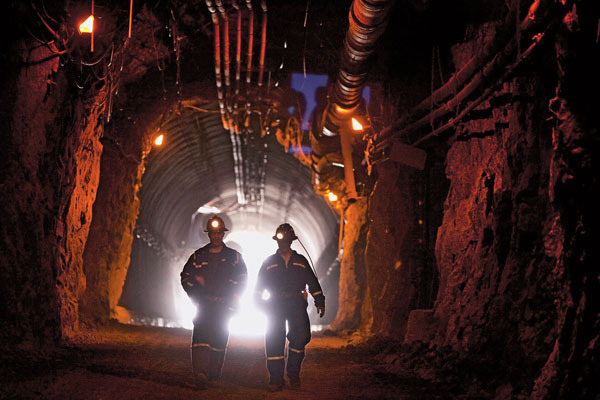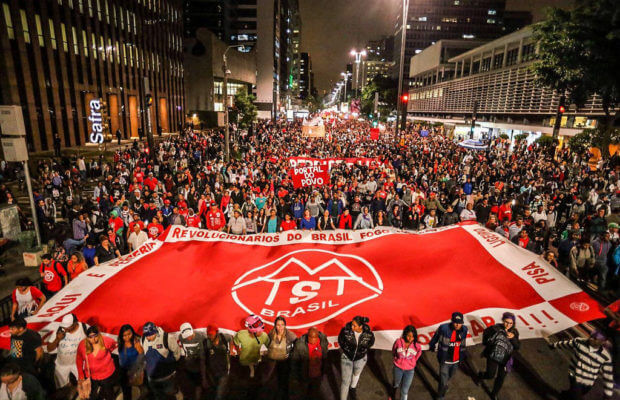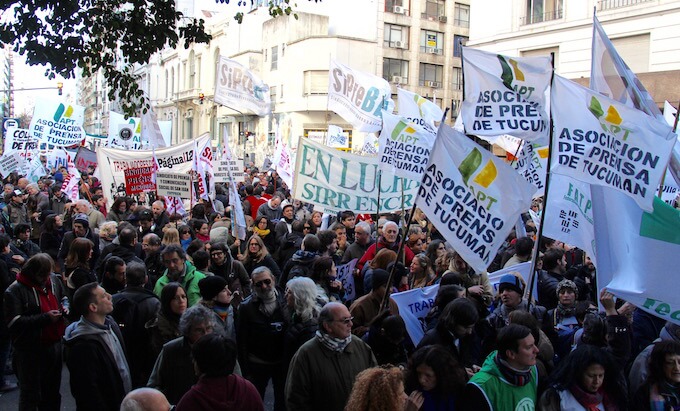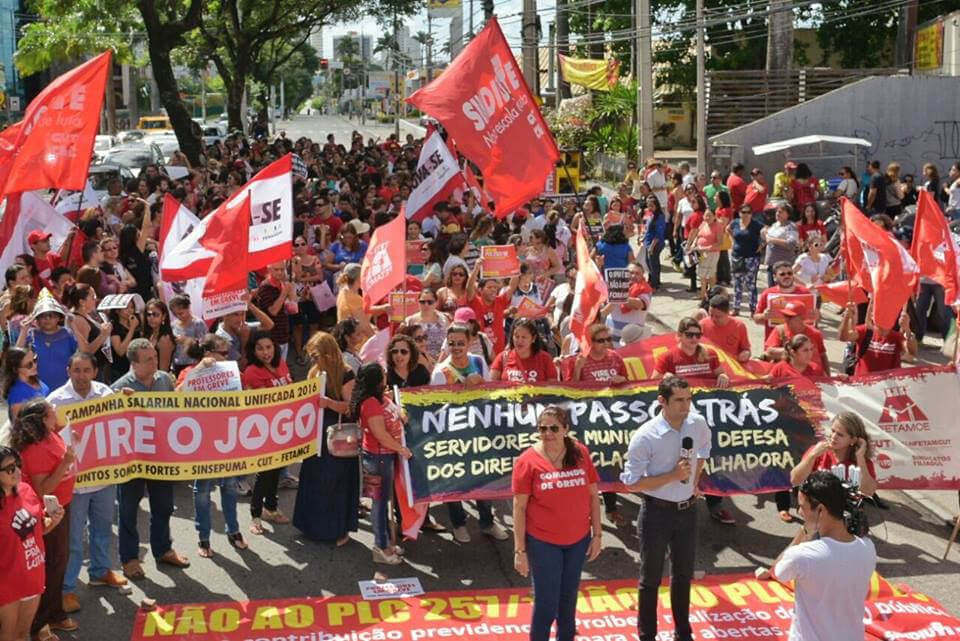By : Marcio Zona / Source: Brasil De Fato / The Dawn News / July 4, 2016.
Mining is the activity that causes the greatest amount of death among workers in Brazil, as reported by the Ministry of Labour (MTE). In addition to mutilation, death and serious illness directly caused by work, the main mining states in Brazil —Goias, Minas Gerais and Pará— have became the most dangerous ones.
From year 2000 to 2010, the Duprat and Figueiredo Foundation (Fundacentro) determined that the Average Rate of Accidents in Brazil was of 8.66%. In Minas Gerais, for example, the statistic of accidents in the mining activity amounted to 21.99%, almost three times the national average.
To understand this matter, Brasil de Fato travelled around the main mining states of Brazil where the companies Vale, Anglo American and Votorantim Group are currently working, to learn more about the incompatibility between the official numbers and the reports issued by these companies and to verify work insecurity in the mining areas.
“Ten years without vacations” is a common situation for Brazilian mining workers, Unions say
The night falls and the end of the day gets closer in the city of Conceição de Mato Dentro, in the State of Minas Gerais –southeast region of Brazil. Rubia Soares, 34, opens the door of her house, fixes her hair and goes to the street where she looks around.
“He is always late”, she says. “If he doesn’t come home too tired, I want to take a walk with the children. He hardly ever has the time”, she murmurs. After 40 minutes of waiting, a thin young man, medium height, comes round the corner. Walking with long steps, he arrives in the house. “Hello, my love”, says the wife as they hug. “Can we go for a walk today, and have dinner with the children?”, Rubia asks. “No way, I want to take a bath and go to bed”, immediately replies Gilberto Mendes, 41, who is beaten after a 12 hours day of work in the mine.
Gilberto is exhausted: he hasn’t had a day off in the last 10 years. He has always worked in outsourced companies that lend their services to mining companies in Minas Gerais —mostly for the Anglo-American and Vale—. He can only manage to make contracts that last one year, maybe two.
“My contracts last no more than two years. It has been like this for the past 10 years. Since I first entered the mining company I have only lived to work, I have never stopped working to take a day off”, Gilberto complains as the clock marks 9 pm and he gets ready to go to bed, after having noodles for dinner.
Nowadays, there are 3 million mining workers in Brazil. Only 500,000 of them have full working rights. According to data by the Mining Union Front, the activity involves more than 1.5 million outsourced workers.
In October 2013, the Labour Ministry denounced that the outsourcing that was being carried out through the Tetra Tech company was “illegal”. The company was set to take part in the implementation of the Minas-Rio project, the biggest pipeline of the world, which was going to link the mining municipality of Conceição de Mato Dentro with Rio De Janeiro.
The Ministry considered that the 435 workers employed by Tetra Tech were carrying out tasks that were not directly linked to the company’s’ main production, therefore, they should have been hired by Anglo-American. Also, 67 workers were subjected to working conditions akin to slavery.
“Nowadays in the mining industry it’s normal for a worker to spend more than 10 years without taking holidays. The contract usually lasts a year and when it is over, the worker is re-hired again by the same company (or a similar one) and loses his right to rest. Outsourcing has no benefits”, said Marta Freitas, Director of the Health Secretary of Minas Gerais.
The Vale company is following Anglo-American’s steps. Back when it was owned by the State, it hired around 30 thousand direct workers in Minas Gerais. After it was privatized in 1997, during the government of Fernando Henrique Cardoso (PSDB), it had around 100 thousand workers —most of them, outsourced.
When consulted by Brasil De Fato, the company said that “they couldn’t assume responsibility for the incorporations or the layoffs of workers from the companies that they hire for the execution of specific activities”, since “those people are employed by the outsourced companies, not by Vale”.
The company also stated that they “carry out an intense fiscalization to guarantee that the sub-contracted companies meet all of their legal obligations” and that they have no information whatsoever that indicates “companies are taking up irregular practises in the hiring of the labour force”.
Precarization
In the past 5 years, Jorge Luis Almeida, 36, was laid off 8 times from the outsourced mining companies of Minas Gerais, which provide services for Samarco and Vale.
This may seem uncommon, however it’s quite usual in this region. He continued looking for jobs other outsourcing companies hired by the same mining companies, he was hired again. Throughout three of those layoff-rehire processes, he continued doing the same job.
“First, they fired me from one company. When I went looking for a new job in another company, I was hired to work in the same position from which I had been fired. They only changed the uniform and the salary, which always decreases”, says the employee.
Anízio Alves Teixeira, President of the Workers of the Mining Industry Association (ATM) says that workers go from one outsourced company to the other, doing the same kind of work, but in worse conditions. “Workers of the mining industry go from one outsourced company to the other, within other greater company. When a person is dismissed, the next job they get always has a worse salary, the conditions are worse and he has less rights”, he denounced.
According to sociologist Tádzio Peters Coelho, researcher at the Politics, Economy, Mining, Environment and Society Group (Federal University of Juiz de Fora, UFJF), that is one the strategies that Vale has taken up in the past few years to deepen the exploitation of the working class in the mining industry and to increase their own profits. “Vale lays off its workers and rehires them the following day through an outsourced company, without the benefits they had”, he explains.
However, the mining company argues that they are not increasing its outsourcing level. “On the contrary, some activities that used to be executed by third parties are now developed by the company. We reject any accusation against Vale regarding the non-fulfilment of the labour legislation. We meet our legal obligations and we invest in training all of our employees”-
Death is part of the job
The ones who get the hardest part of working in a mine are outsourced workers. “8 out of 10 deaths in the mining industry are of outsourced workers”, affirms Anízio Teixeira.
The greatest environmental crime of the history of Brazil was caused by the company Samarco, when the Fundao dam broke and tonnes of toxic waste destroyed an enormous part of the Mariana municipality, in Minas Gerais. Most of the victims were outsourced workers. 12 of the 14 workers who died there were outsourced workers.
Among them was Ailton Martins dos Santos, 43, who had been working at the Samarco dam and had been hired by the Integral company.
María Julia Andrade, from the National Coordination of the Movement of Popular Mining Sovereignty (MAM) of Minas Gerais, said that what happened is a crime. “Ailton, unfortunately, was a victim of the tragedy of November 5, 2015. This was a forseeable tragedy and as this is proven by the research carried out by the Civil Police. So there’s ground to say that this constitutes an intentional homicide, there was an attempt to kill”, he said.
Brasil De Fato contacted the companies Anglo American, Samarco and Tetra Tech on this matter, but they did not comment.











